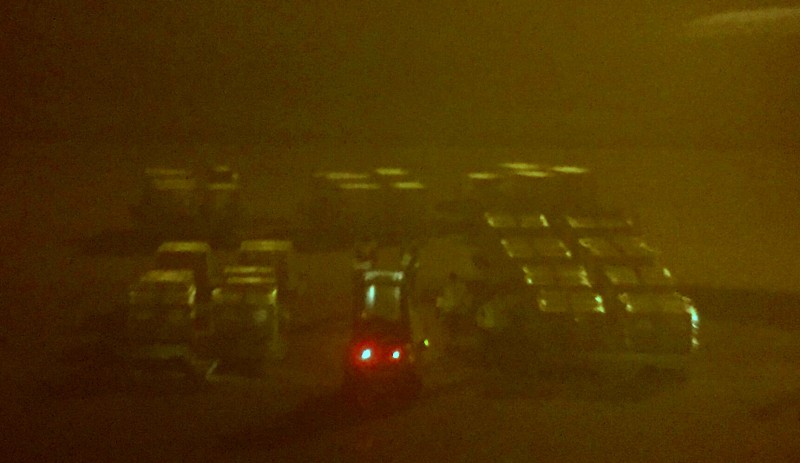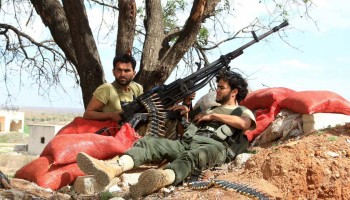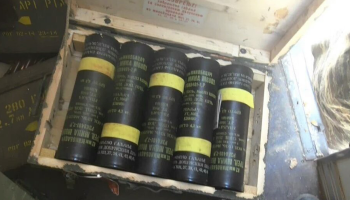Since Syria’s civil war began its bloody escalation five years ago, Central and Eastern European countries have poured thousands of tons of arms and ammunition into four countries that are the main backers of armed opposition groups – Saudi Arabia, Jordan, the United Arab Emirates (UAE), and Turkey.
It is a trade that has been deeply profitable. It is also very likely illegal, according to human rights and arms experts.
Reporters for the Balkan Investigative Reporting Network (BIRN) and the Organized Crime and Corruption Reporting Project (OCCRP) showed their findings and documentation to experts.
“The evidence points towards a systematic diversion of weapons to armed groups accused of committing serious human rights violations,” said Patrick Wilcken, an arms researcher for Amnesty International.
“If this is the case, the transfers are illegal under the ATT (the United Nations’ Arms Trade Treaty of 2014) and other international law and should cease immediately,” he said.
The reporters found that the export licenses from Bosnia and Herzegovina (BiH), Bulgaria, Croatia, the Czech Republic, Montenegro, Slovakia, Serbia, and Romania were often granted despite ample evidence that many weapons are ending up in Syria with armed opposition as well as Islamist groups accused of widespread abuses.
The eight countries approved the export of at least €1.2 billion worth of weapons and ammunition to the four countries.
But while the states themselves say the trade is both legal and lucrative, experts generally disagree saying at least a share and maybe all of the trade it not legal. What everyone agrees on is that in the international arms trade, countries face little repercussions for their decisions either way.
Rules Without Sanctions
The global arms trade is regulated by three layers of interconnected legislation -- national, European Union (EU) and international – the UN Treaty – but with no formal mechanism to punish those who break the rules.
The UN treaty forces governments to carry out a risk assessment, work out if there are mitigating measures that can be taken, and not export if there is an “overriding risk” that the weapons would be used to break humanitarian laws, abet terrorists or commit atrocities. It also puts the onus on governments to assess whether the weapons will be diverted to third parties, such as rebel groups. BiH, Bulgaria, Croatia, the Czech Republic, Montenegro, Romania, Serbia and Slovakia are signatories to the 2014 treaty.
EU member states are also governed by the bloc’s Common Position on arms exports, which features similar requirements. EU aspirants BiH and Montenegro have already signed on to the measures, while Serbia is in the process of doing so. On top of that, European nations mostly have arms sales laws that are already in line with international norms.
But there is little in the way of a formal mechanism to enforce the rules. In this environment, Central and Eastern European countries went ahead with exports with little apparent concern for how or where the weapons might be used.
The countries appear to have taken at face value the end-user certificates – documents issued by the countries purchasing the weapons that declare who will be using them and that guarantee they will not be re-exported – without probing any deeper.
This sort of approach is not enough to be on the right side of the law, said Roy Isbister, an expert on arms trade laws with the London-based NGO Saferworld.
"Due diligence obliges states to not only collect paperwork, but to assess that paperwork. And, in turn, assessing paperwork is itself only part of a proper export risk assessment,” he said.
“States that rely on end-use certificates and the like as sufficient justification for issuing licences are not meeting their legal obligations.”
The Probable Misuses
The bulk of the € 1.2 billion Central and Eastern European arms deals – totaling € 829 million – were made with Saudi Arabia.
BIRN and OCCRP obtained Saudi contracts and end-user certificates with Serbian and Slovakian arms brokers detailing their request for vast amounts of old Soviet, Warsaw-Pact and Yugoslav era weaponry.
Weapons from Central and Eastern Europe are largely incompatible with Saudi Arabia’s standard equipment, which is mostly Western-made, according to arms expert Jeremy Binnie from Jane’s Defense Weekly. This makes the region’s hardware a likely candidate for diversion to Syria and, to a lesser extent, the battlefields of Yemen and Libya where these weapons are already heavily used.
Internal records obtained by BIRN and OCCRP show Serbia was one government that was fully aware of this discrepancy – for a time, at least. In November 2013, the Serbian government blocked a € 20 million deal with Saudi Arabia precisely because the Kingdom’s military did not have use for such arms which made Serbian officials concerned that the weapons would be diverted.
Just over a year later, however, Serbia’s government abruptly reversed its stance, approving several shipment worth € 135 million.
The arms export licenses to Saudi Arabia were approved because they would have a “positive impact” on the “operation of Serbia’s defense industry”, the Serbian Ministry of Defense said in a written response to BIRN and OCCRP.
Economic benefits appear to have played a key role in the decisions of Central and Eastern European countries to sell the weapons, said Bodil Valero, a Swedish Green Party Member of the European Parliament who was rapporteur for the last EU arms export report.
“They want to have people working in the arms industry with jobs, of course,” Valero said.
“Countries selling arms to Saudi Arabia or the MENA [Middle East and North Africa] region are not carrying out good risk assessments and, as a result, are in breach of EU and national law,” she said.
Arms export licensing authorities in Croatia, Czech Republic, Serbia, Slovakia and Montenegro told BIRN and OCCRP that they relied on verifying documents such as end-user certificates in approving sales.
“What we can do is to comply with all the procedures and [ensure] that we have delivered [weapons] to a legitimate buyer,” said Stevan Nikcevic, the state secretary of Serbia’s trade ministry.
Darko Kihalic, the head of the arms licensing department at the Croatian Ministry of the Economy, told BIRN and the OCCRP his country can do little but check paperwork.
Saudi Arabia is not a “blacklisted” country, he said, adding:
“Are there misuses? There probably are.”
A UN Human Rights report, published in March 2015, noted that Croatia, despite its international obligations, was showing “a disturbing lack of concern about the re-transfer and end use of weapons to countries including Syria and Iraq.”
“In the end it is always the [exporting] government that has responsibility. They take the decision and they have to be accountable for these decisions,” Valero said adding that most countries were simply not doing enough due diligence.
Trail of Atrocities
In Syria’s brutal war, it is not just the forces of Syrian President Bashar Al-Assad or the headline-grabbing extremists of the Islamic State that are committing atrocities.
Anti-regime armed groups, including Islamists, backed by regional nations and the United States have also been implicated in widespread abuses.
“I don't think anyone is fighting clean in Syria at the moment,” said Hadeel Al-Shalchi, a Syria researcher at Human Rights Watch (HRW).
Magdalena Mughrabi, of Amnesty International’s Middle East and North Africa program, called on Turkey, the Gulf states and “other backers” to halt weapons transfers to rebels.
Amnesty’s Mughrabi added: “The international community must not turn a blind eye to the mounting evidence of war crimes by armed opposition groups in Syria. The fact that the scale of war crimes by government forces is far greater is no excuse for tolerating serious violations by the opposition.”
Legal Remedies
With no formal sanctions mechanism in exists to punish countries flouting their obligations, individuals and non-governmental organizations are finding other ways to seek legal redress.
In the United Kingdom, the Campaign Against the Arms Trade has launched a judicial review against the British government for its continued exports to Saudi Arabia because of its support of factions in Yemen, where fighting has killed thousands of civilians since 2015.
The group has said the British Department of Business, Innovation and Skills broke the national arms export law, EU regulations and the ATT because there is a clear risk these arms could be used by Saudi forces in breach of international humanitarian law.
The British government has responded by saying its oversight and checks on its weapons exports are among the most robust in the world.
Valero, the Swedish member of the European Parliament, said that if action in national courts fails, other options exist.
“I think these countries could be taken to the European Court of Justice,” she said.
In March of this year, the Netherlands became the first EU country to stop arms exports to Saudi Arabia, citing mass executions and civilian deaths in Yemen.







